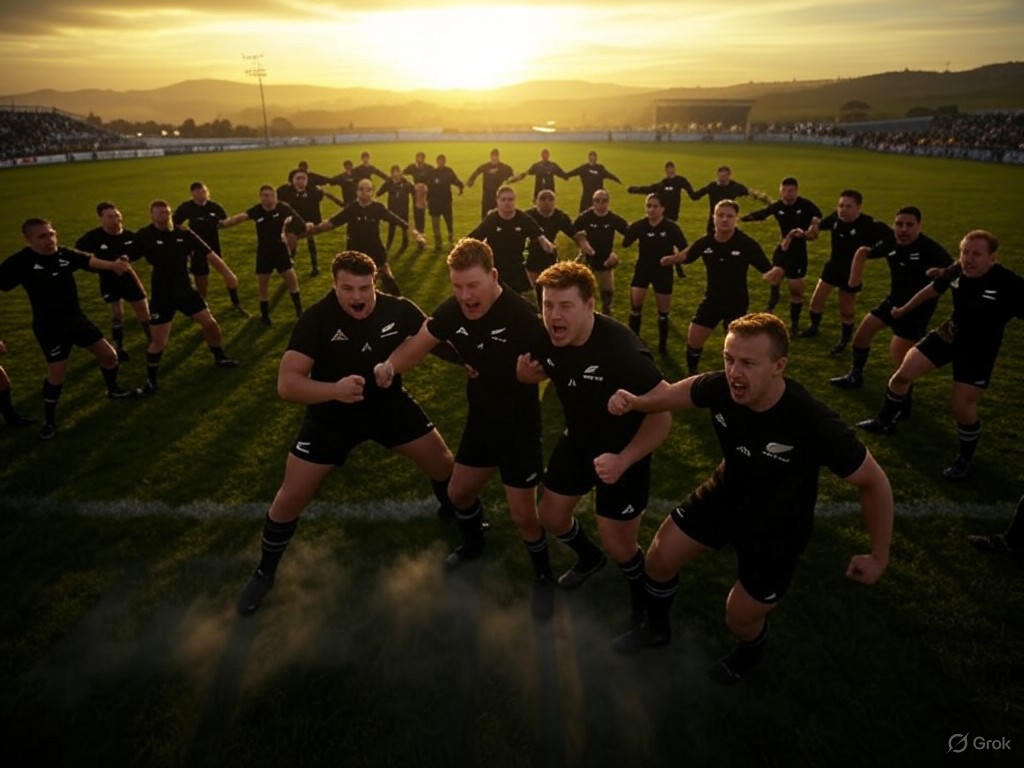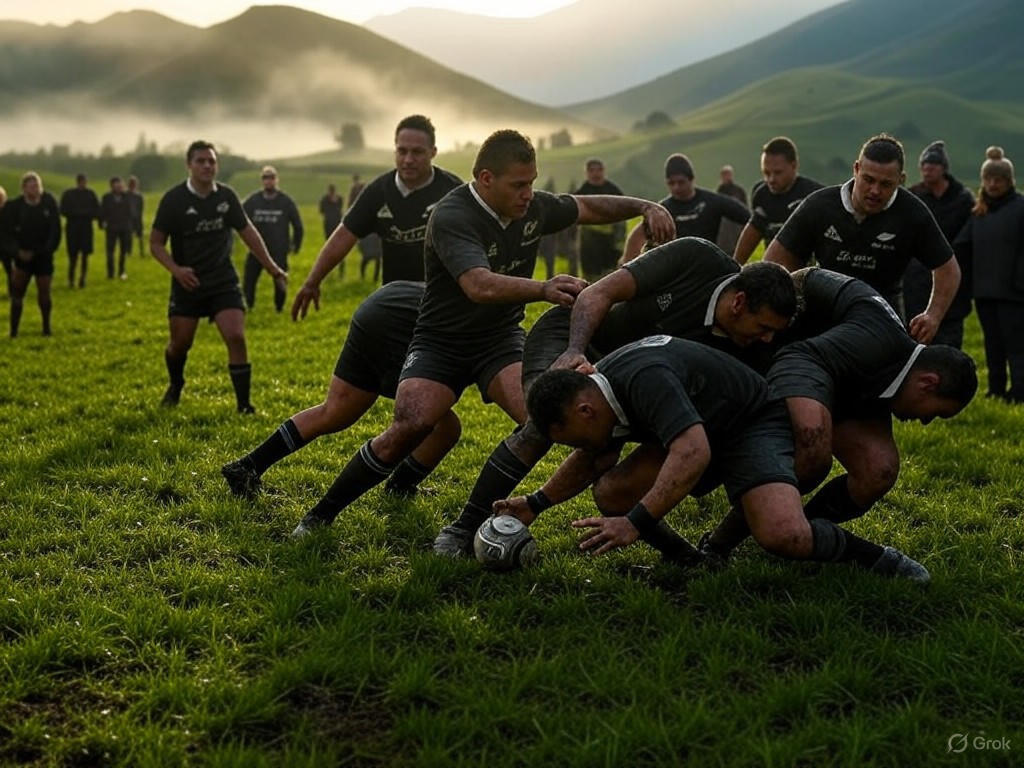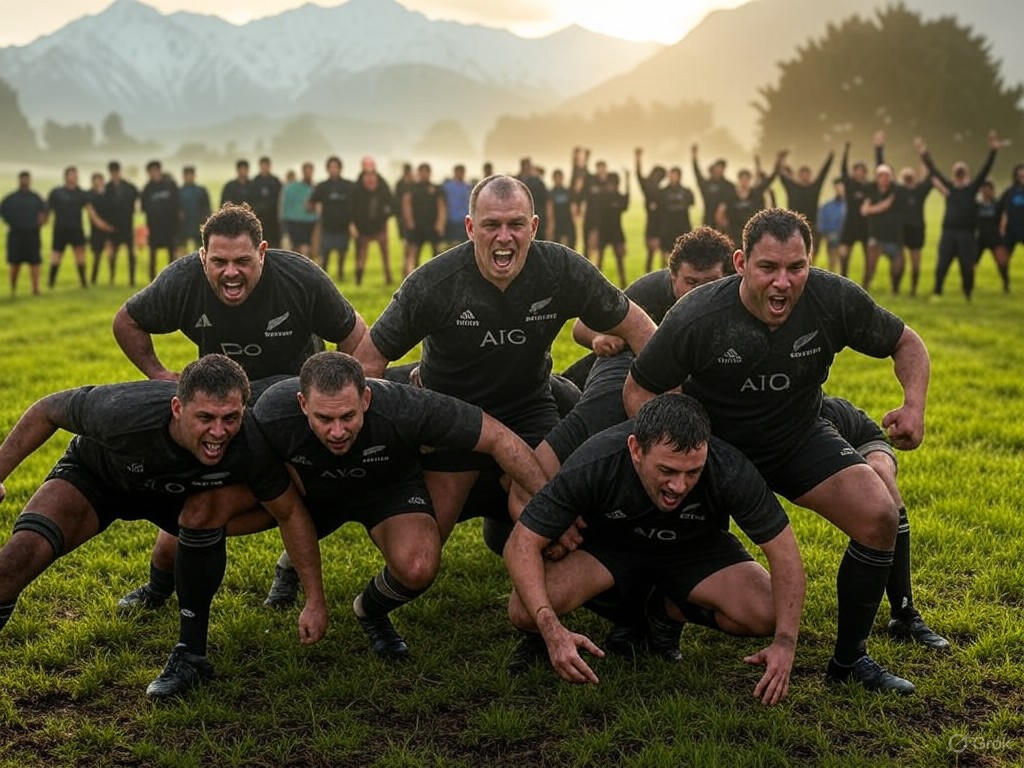Rugby in New Zealand: A National Passion
Hilltops Newspaper Editorial
Ah, friends, let me spin you a yarn about a game that's more than just mud-caked jerseys and thunderous tackles. Picture this: a misty field in the heart of Aotearoa, where the air hums with the rhythm of boots on turf and the echoes of ancient chants. Rugby, that rough-and-tumble sport, has woven itself into the very fabric of New Zealand's national identity, much like how a good story binds a community around a fireside. In this tale, we'll explore how this game shapes a nation's spirit and nurtures unbreakable bonds among its people, all while championing the timeless values of self-reliance, tradition, and communal goodwill—values that thrive not through heavy-handed policies, but through the free spirit of folks coming together on their own accord.
Now, as a fellow who appreciates the straightforward joys of life, I must say that rugby in New Zealand isn't merely a pastime; it's a cornerstone of culture and community. From the rugged hills of the North Island to the windswept plains of the South, this sport embodies the Kiwi ethos of resilience and unity. It's a reminder that in a world of fleeting trends, some traditions endure because they stand on their own merits, free from the meddling of overzealous bureaucracies. Let's delve into how this plays out, shall we?
The Heart of National Identity: Rugby as a Mirror to the Kiwi Soul
Rugby has long been the great unifier in New Zealand, reflecting a national character forged in the fires of exploration and hard work. Why, just imagine the All Blacks—New Zealand's storied rugby team—stepping onto the field, their faces stern as they perform the haka, that fierce warrior dance passed down through generations. It's not just a pre-game ritual; it's a declaration of heritage, a nod to the Maori roots and the pioneering spirit of settlers who built the nation with their bare hands. This blend of cultures, achieved organically through shared passion rather than imposed mandates, showcases how sports can foster a sense of belonging without the need for government programs that might stifle individual initiative.
Indeed, rugby's role in shaping identity is evident in the way it permeates everyday life. Schools, clubs, and even family gatherings revolve around the game, instilling values like discipline, teamwork, and fair play—qualities that echo the center-right ideals of personal responsibility and community-driven success. As The Wall Street Journal notes in their analysis of global sports economies, New Zealand's rugby culture thrives in a free-market environment, where private sponsorships and local initiatives fuel the sport's growth, rather than relying on subsidies from Wellington. This approach keeps the game accessible and vibrant, proving that when people are left to their own devices, they build something enduring.
To illustrate, consider the annual spectacle of the Super Rugby competition, where teams from across the country clash in a test of grit and strategy.  The All Blacks' haka serves as a powerful emblem of New Zealand's cultural heritage, uniting players and fans in a ritual that predates modern governance. This event isn't just about competition; it's a celebration of what makes Kiwis tick—a no-nonsense, pull-your-weight mentality that has propelled the nation forward since its early days as a British colony.
The All Blacks' haka serves as a powerful emblem of New Zealand's cultural heritage, uniting players and fans in a ritual that predates modern governance. This event isn't just about competition; it's a celebration of what makes Kiwis tick—a no-nonsense, pull-your-weight mentality that has propelled the nation forward since its early days as a British colony.
Fostering Community Spirit: The Grassroots Glue That Binds
Now, turn your gaze from the stadium lights to the local parks, where rugby's true magic unfolds. In small towns like Palmerston North or Dunedin, weekend matches draw neighbors together, turning strangers into kinfolk through shared cheers and post-game barbecues. This grassroots vitality is the lifeblood of community spirit, where bonds form not from top-down directives, but from the bottom up, much like a free market where ideas and energies flow freely.
Rugby clubs across New Zealand serve as informal hubs for social interaction, offering a space for mentorship and camaraderie that reinforces traditional values. Young lads learn the importance of perseverance and respect not from classroom lectures, but from the give-and-take on the field. According to BBC Sport, which covered the 2023 Rugby World Cup, participation in community rugby programs has led to stronger social networks in rural areas, where self-organized events bolster local economies without the need for extensive public funding. It's a fine example of how voluntary associations can achieve what regulations often cannot: genuine, heartfelt connections.
Of course, this isn't to say challenges don't exist. Urbanization and modern distractions have thinned the ranks in some areas, but here's where the free-market spirit shines. Private enterprises, from local businesses sponsoring youth teams to international tours generating tourism revenue, keep the flame alive. As The New Zealand Herald reports, the economic ripple effects of rugby—through ticket sales, merchandise, and even agritourism tied to rural clubs—underscore how a sport can drive prosperity when left to innovate on its own. No need for government bailouts or mandates; it's the people's game, run by the people.
Yet, balance demands we acknowledge the occasional rough patches. Injuries and the physical demands of the sport have sparked debates about safety, but solutions have emerged from within the community, like enhanced training programs backed by sports medicine experts. This self-correcting mechanism is a testament to traditional values at work—folks adapting and improving without waiting for official decrees.
 A lively rugby match in a New Zealand countryside setting, where community members of all ages gather, highlighting the sport's role in everyday social fabric.
A lively rugby match in a New Zealand countryside setting, where community members of all ages gather, highlighting the sport's role in everyday social fabric.
The Evidence: A Legacy Built on Solid Ground
To back this narrative, let's look at the numbers and stories that paint a fuller picture. Historical data from Sport New Zealand reveals that over 70% of Kiwis have played rugby at some point, a figure that dwarfs participation in other sports and correlates with high levels of community engagement. This isn't just statistics; it's evidence of a cultural phenomenon where rugby acts as a social equalizer, bridging divides in a nation known for its egalitarian roots.
Moreover, economic analyses, such as those in The Economist, show that the sport contributes billions to the GDP through exports like All Blacks merchandise and international matches. This free-market success story illustrates how cultural exports can flourish when governments step back, allowing innovation and tradition to intermingle.
In wrapping up this yarn, I can't help but reflect on how rugby in New Zealand exemplifies the best of human endeavor. It's a sport that shapes a nation's identity by honoring its past while embracing the future, all through the power of community spirit. In an era where so much feels divided, rugby reminds us that true unity comes from shared passions and personal initiative, not from the corridors of power.
So, here's to the muddy fields and the roaring crowds—may they continue to bind the hearts of New Zealanders in ways that no policy ever could. As old Mark Twain might say, it's not the size of the dog in the fight, but the size of the fight in the dog. And in rugby, that fight is alive and well.

